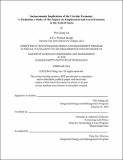Socioeconomic Implication of the Circular Economy: A Preliminary Study of The Impact on Employment and Local Economy in the United States
Author(s)
Lin, Wei-Ching
DownloadThesis PDF (7.966Mb)
Advisor
Nicholas A. Ashford
Terms of use
Metadata
Show full item recordAbstract
A circular economy is an economic system with the goal to minimize resource input and waste, emission, and energy leakages. It has gained momentum in the last decade as an increasing number of businesses have adopted some circular strategies in their sustainable development roadmap. Economic and resource efficiency have predominated studies of the circular economy's benefits, while on the other hand, there are scarce studies of the circular economy's impact on jobs and employment, which are often limited to ambiguous perspectives surrounding job creation. Employment, however, plays a critical role that has a direct impact on social sustainability, and therefore needs to be reviewed through factors such as employment opportunities, skills, wages, earning quality, job security, workplace risk, work schedule and social dialogue, etc. This study examines two sectors connected to the circular economy with the highest potential for employment growth: 1) the waste sector, and 2) the reuse sector. The impacts of the circular economy on these areas were examined through semi-structured interviews with experts and stakeholders ranging from businesses, foundations, municipalities, academia and labor unions in the United States. In addition, this study examines how COVID-19 has changed the workforce in the last two years. The findings of this study reveal issues and vulnerability of work that are most relevant to the circular economy. In the waste sector, workers work longer hours under high risk environments. In the reuse sector, the work is often manual and involves some informal workers who are less protected by labor law. In addition, the study shows that COVID-19 has changed the workforce drastically. The vulnerability of the workforce presents the need for institutional actors to approach the circular economy systemically with the goal to achieve strong sustainability and to establish policymaking and better governance framework to keep the transition of zero waste and the circular economy resilient and equitable for society.
Date issued
2022-02Department
System Design and Management Program.Publisher
Massachusetts Institute of Technology